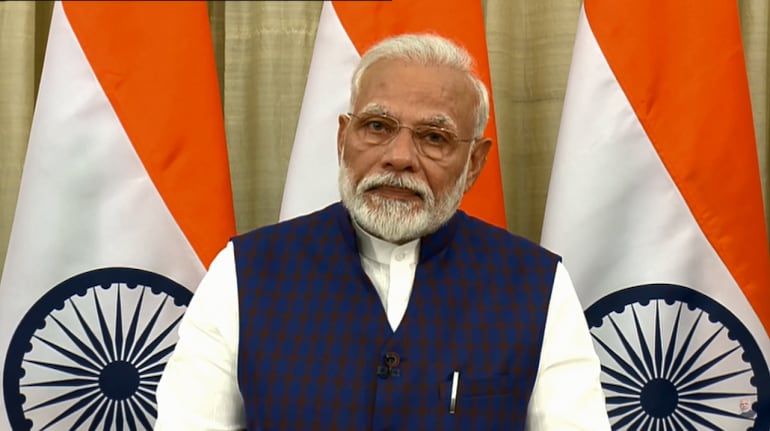



Kajari Kamal
India’s first Prime Minister Jawaharlal Nehru could not have hoped for a better homage a few weeks short of his death anniversary. Prime Minister Narendra Modi’s historic first address to the Summit of the Non-Aligned Movement (NAM), an initiative which has Nehru written all over it, has arguably redefined the scope and utility of a movement which is believed to have been buried for good, for both ideological and utilitarian purposes. Perhaps, what would make Nehru rest in peace is Modi passionately taking forward his dream of a self-reliant India, expressed in Hindi as ‘atmanirbhar bharat’.
Chronologically, let’s take the NAM summit first. On May 4, Modi addressed an online NAM Summit on the theme ‘United against COVID-19’. The previous two NAM summits (Venezuela 2016, and Azerbaijan 2019) did not see Modi’s participation (a first, barring the exception of late Chaudhary Charan Singh in 1979) and was reasoned on the grounds that the ‘world today has moved on from what NAM founding leaders faced’. Some NAM pessimists also see its redundancy in the context of a ‘new compact’ between India and the West.
There is a certain utility in differentiating between the Non-Aligned Movement (NAM) and nonalignment as a principle. While the former has lost its contextual relevance in a post-Cold War world order, nonalignment as a basic policy has innovatively and imaginatively been put to use in the conduct of India’s foreign policy. Perhaps, the flexibility built into the concept of nonalignment has allowed it to remain both relevant and useful. “Non-Alignment is a basic policy, but its application to particular circumstances or resolutions is a matter for judgment”, Nehru said in a 1961 interview. Flowing from this is the basic tenet of nonalignment — to retain the right to judge every case independently in pursuit of the national objective.
Modi, through his address, has resuscitated the movement in a manner which alludes to both the spirit of the movement and nonalignment as a guiding force. By pointing out that NAM has often been the world’s moral voice, Modi’s words echoed Nehru’s sentiments at the first NAM Conference in 1961 — “The power of nations assembled here is not military power or economic power, nevertheless it is power. Call it moral force”.
Modi’ exhortations to the member states to fight the world crisis by pooling resources and experience outlines the very purpose of the NAM — to serve as a forum for political coordination, reinforce multilateralism, and harmonise strategies to jointly confront threats. Modi, through his summitry address, has deftly conflated national interest and idealism — something which would do Nehru proud.
Modi’s surprise participation may be explained by India’s pro-active diplomatic response to COVID-19 and as part of a broader practical approach to use the existing platforms to coordinate state action and project India’s leadership capabilities. This is necessitated, in part, due to the pandemic relegating the global leadership to the margins, leaving nations to fight their own wars. In the wake of a potential recalibration of the world order, nonalignment in the ‘traditional sense’ of the word — independence of judgment and freedom of action in pursuing one’s national interest — becomes increasingly relevant.
An idea deeply connected with nonalignment is self-reliance. The ability to make independent judgments critically hinges on how developed one’s own state capacity is. Modi in his May 12 address to the nation announced India’s resolve of ‘atma nirbharta’ to face the COVID-19 challenge. This clarion call for self-reliance is not new. It has been Nehru’s watchword for a newly independent India faced with a bipolar world order, a crisis in its own right. Perhaps, it is because the culture and tradition of India speak of self-reliance that both Nehru and Modi are united in their views on how best to tackle a crisis.
So, what does this comparison tell us? First, that India’s road to self-reliance has been a long yet incomplete one. Hopefully, 2020 would be to Modi what 1991 was to PV Narasimha Rao. Second, that there are certain basic principles that guide India’s foreign policy formulations. These may allow variations in different strategic contexts, but rarely bring about deviations. Perhaps, it is a robust strategic culture which lends meaning to objective variables and potentially determines State behaviour in a culturally unique way.
Kajari Kamal is faculty, Takshashila Institution, and her research focuses on the concept of ‘strategic culture’ in the Indian context. Views are personal.
Discover the latest Business News, Sensex, and Nifty updates. Obtain Personal Finance insights, tax queries, and expert opinions on Moneycontrol or download the Moneycontrol App to stay updated!
Find the best of Al News in one place, specially curated for you every weekend.
Stay on top of the latest tech trends and biggest startup news.